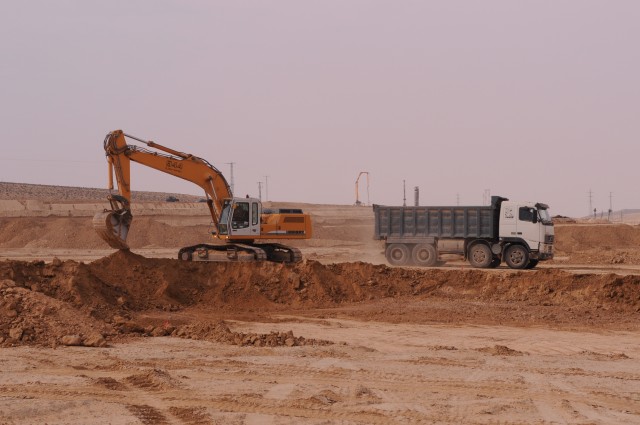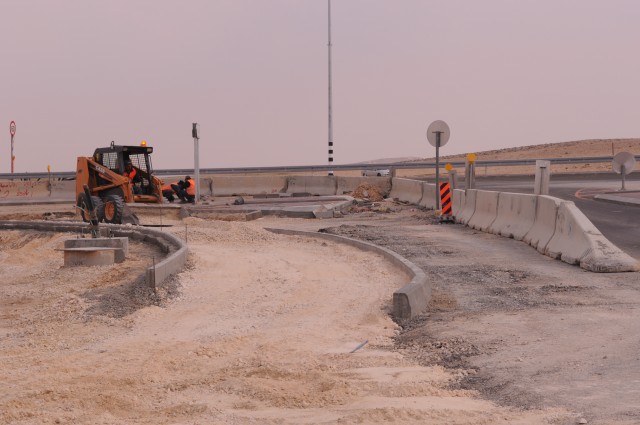Making the Desert Bloom: IDF Heads South
Like Israel’s pioneers, the IDF is making the desert bloom. In just a few months, the IDF will make a massive transition to the Negev region where its presence will expand local communities.
The IDF is nearing the end of its planning stages for a major move to the Negev desert. The transition, which is to include the construction of a large cluster of training bases, is to begin soon. Data has been released showing the significant benefits the IDF’s move will have for Israel’s society and economy in the south.
Lieutenant Colonel Shalom Alfassy, a leader in the IDF’s effort to move training bses to the Negev, discussed the transition in an interview. “The project has several objectives, including societal and civilian objectives aimed at strengthening the Negev,” he explained. “This is true across the board –from employment to housing to education.”

![]()
Lt. Col. Alfassy described the magnitude of the project’s anticipated influence on surrounding areas. “We are establishing an anchor in the Negev,” he said. “It has civilian, social, and environmental implications for all of the surrounding areas.”
The transition is also expected to improve the quality of IDF training. According to Lt. Col. Alfassy, the new training bases will be equipped with advanced facilities and cutting-edge technology designed to enhance the preparation of soldiers for their roles in the IDF.
“There will be new infrastructure, new classrooms, and a better training environment,” he explained, describing new high-tech “smart classrooms” that will vastly improve the learning experiences of soldiers. The facilities will feature advanced computers to allow for independent learning and a sophisticated electronic library that will enable soldiers to download lessons and review them.

![]() Plans for the IDF’s move to the south
Plans for the IDF’s move to the south
Using Green Technology
The IDF will construct the new facilities using the principles of ecological design, creating structures that conserve energy and reduce waste.
“The facilities are built in such a way that they are self-sustaining," Alfassy explained. “This includes the use of solar energy for heating water and of construction materials that allow the buildings to consume as little energy as possible. The buildings are insulated in such a way that one can use air conditioning for a limited period of time, allowing the rooms to cool themselves naturally.”
According to Lt. Col. Alfassy, the new facilities adhere to higher environmental standards than most existing IDF infrastructure, leading the way for similar construction in the future.
Investing in the Negev
The Financial Advisor to the Chief of Staff descrived the IDF’s southward transition as “the locomotive behind an economic, social, and national revolution.”
The south is preparing to absorb large numbers of professional soldiers and civilian IDF employees, alongside the regular soldiers who will serve in the region. According to Lt. Col. Alfassy, the transition will lead to a significant increase in IDF human resources, attracting large numbers of IDF civilian staff who will come to live and work in the area.
The IDF will also bring advanced educational infrastructure and development to the south, resulting in a stronger system of higher education in the Negev.


As a part of the transition to the Negev, the IDF will provide grants and housing support to families moving to the south. The Financial Advisor to the Chief of Staff estimates that 40% of those moving will be married and 33% will have children. Roughly 60% of new residents are between the ages of 22 and 30.
Moreover, data shows that approximately 63% of those intending to move to the Negev live in Tel Aviv and central Israel, with the same percentage possessing undergraduate or graduate degrees.
The IDF believes the transition will also increase the size of the student population and result in improvements in public transportation. A developed road and rail network is in the works to facilitate mobility for the new residents. These improvements will come with a more developed healthcare infrastructure that will help promote advanced medical studies.
The IDF has estimated that the transition will encourage additional investment in education, health, transportation, and municipal infrastructure in the south. The increased purchases and services demanded by military units will bring additional business and jobs. All these factors are expected to contribute to the prosperity of the Negev.



